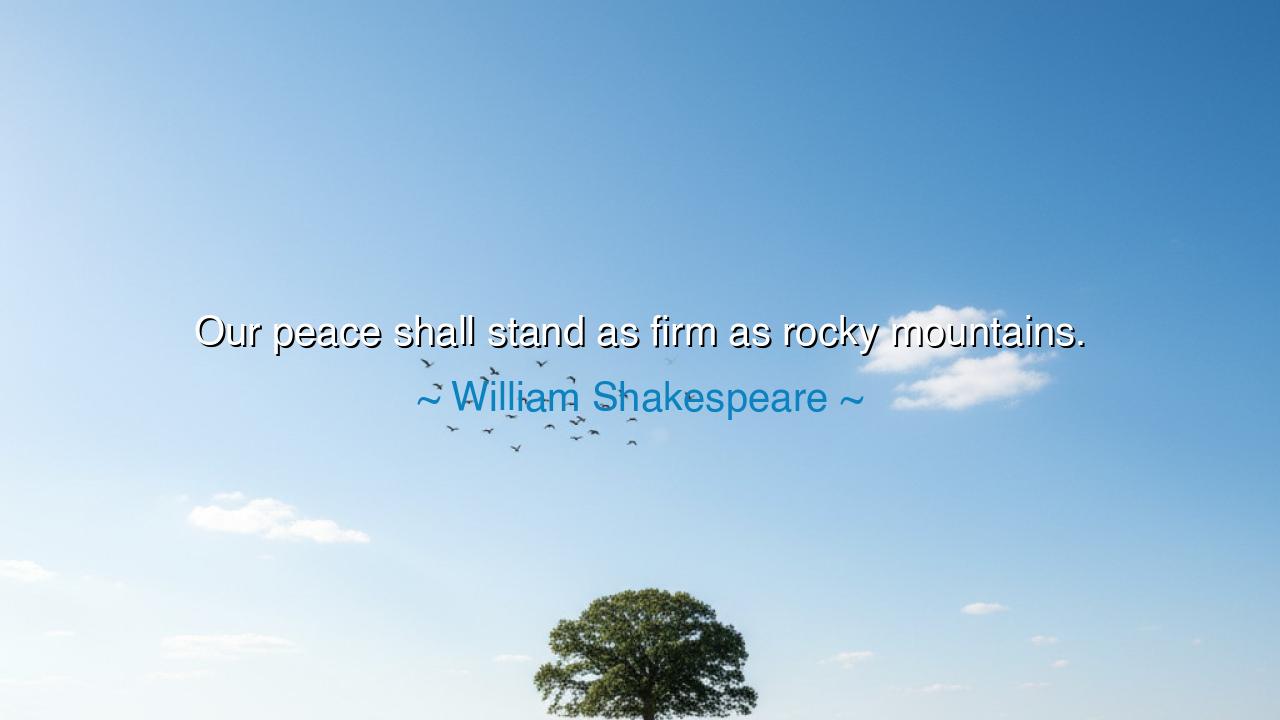
Our peace shall stand as firm as rocky mountains.






In the words of Shakespeare, “Our peace shall stand as firm as rocky mountains,” we hear not merely a poetic flourish, but a vision of the human spirit’s endurance. The phrase calls to mind the majesty of nature itself—the immovable peaks that have withstood storm, wind, and the turning of countless ages. To liken peace to a mountain is to say that true harmony of the soul, once established, is not easily shattered by the passing tempests of the world. It is no fleeting calm upon the waters, but a fortress raised high, unyielding, and crowned with eternal strength.
This teaching is rooted in the wisdom of the ancients. Mountains were long seen as sacred pillars of heaven and earth, symbols of permanence and divine order. Shakespeare’s choice of this image speaks to the human yearning for a peace that is not fragile, but enduring—a peace that is inwardly founded upon truth, virtue, and unshaken resolve. Just as the mountain does not bow when clouds gather at its peak, so too does the heart that clings to righteous peace remain unshaken when adversities rise.
Consider the story of Marcus Aurelius, the philosopher-emperor of Rome. Beset by wars at the empire’s borders and personal griefs that gnawed at his soul, he might easily have surrendered to despair. Yet through his meditations he found within himself a stillness that no sword could pierce. His peace stood like rocky mountains: enduring amidst chaos, rooted in the wisdom that the soul may govern itself, even when the world rebels. His strength of spirit carried Rome through bitter trials, and his example still endures as a beacon to all who seek inner firmness.
This image also teaches us that peace is not the absence of struggle, but the triumph of steadiness within it. The mountain does not repel storms by fleeing them—it simply endures. So it is with us: the man or woman who would live nobly must learn to cultivate a peace so deeply rooted that insult, failure, or loss cannot erode it. To be immovable in purpose and unyielding in virtue is the truest shield against life’s storms.
Yet we must also remember that such peace is not gifted lightly. Just as a mountain is shaped by millennia of unseen forces—by the heaving of earth, the fire of molten stone, and the chiseling of relentless wind—so too must the human soul be shaped by trial, discipline, and the slow work of self-mastery. To stand firm, one must practice patience, seek wisdom, and choose integrity over vanity. The peace that lasts is forged through endurance.
Practical is this wisdom for every age. When quarrels arise in our homes, let us not answer wrath with wrath, but with the calm dignity of the mountain that does not stoop to echo thunder. When failures threaten our confidence, let us stand rooted, saying, “This too shall pass, but my spirit remains.” When the world tempts us to abandon what is right for what is easy, let us remember that peace is only firm when it rests on truth.
Thus, dear listener, the lesson of this phrase is clear: seek not the fragile peace of comfort, but the enduring peace of strength. Build within yourself a mountain of character that no storm can crumble. Pray, meditate, learn, and endure. Make your peace not a delicate flower of spring, but a stone foundation upon which generations may lean.
For in the end, if our peace stands as firmly as rocky mountains, then though the ages roll, though kingdoms fall, and though storms break against us, we shall remain steadfast—guardians of harmony within and beacons of stability to all around us. This is the inheritance Shakespeare speaks of, and the charge we must carry into our own lives.






AAdministratorAdministrator
Welcome, honored guests. Please leave a comment, we will respond soon